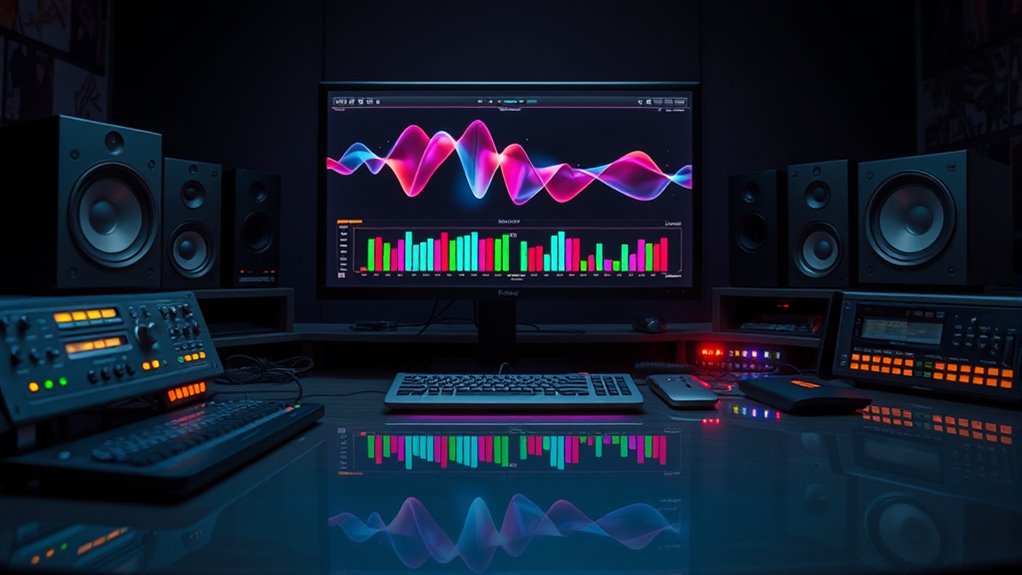Video game scores are carefully composed to influence your emotions through musical themes that set the tone and evoke specific feelings. Developers use techniques like contrasting melodies, tempo shifts, and instrumentation to heighten tension or relief and create immersive soundscapes. Adaptive music responds to your actions, intensifying gameplay moments and forging emotional connections. By understanding how these elements work together, you can discover how composers craft powerful experiences that guide your emotional journey—if you explore further, you’ll uncover even more insights.
Key Takeaways
- Composers use contrasting melodies, tempo shifts, and instrumentation to evoke specific emotions like tension, relief, or hope.
- Adaptive music adjusts in real-time to gameplay, intensifying feelings during combat or exploration.
- Recurring motifs or leitmotifs reinforce character, place, or theme, triggering emotional connections through familiarity.
- Dynamic soundscapes and ambient textures create immersive atmospheres that influence mood and immersion.
- Composers utilize musical cues such as crescendos or minor keys to signal danger, evoke nostalgia, or build anticipation.
The Role of Musical Themes in Setting the Tone

Have you ever noticed how a game’s music instantly influences your mood? It’s often the musical themes that set the tone from the start. Developers use ambient textures to create immersive environments, subtly guiding your emotional response. These textures build atmosphere, making scenes feel more alive or foreboding. Simultaneously, leitmotif development introduces recurring musical motifs that symbolize characters, places, or ideas. When a familiar theme reappears, it reinforces your connection to the story or evokes specific emotions. These musical elements work together seamlessly, shaping your experience without you even realizing it. By carefully crafting ambient textures and developing leitmotifs, composers influence how you feel about what’s happening on screen, making every moment more impactful. Additionally, understanding the role of musical themes in setting the tone can deepen your appreciation for how sound design enhances storytelling in games.
Techniques for Evoking Specific Emotions

Developers and composers use a variety of musical techniques to evoke specific emotions in players, shaping their experience and response to the game. By leveraging emotional storytelling and immersive atmospheres, they guide your feelings throughout gameplay. Techniques include using contrasting melodies to heighten tension or relief, employing tempo changes to energize or calm, and selecting instrumentation that aligns with the mood—such as haunting strings for suspense or bright piano for hope. Additionally, subtle dynamics can build anticipation or create intimacy. These methods help you connect with the story and environment, making each emotional moment feel genuine and impactful. The choice of projector technology can also influence how vividly these musical cues are perceived visually, enhancing the overall emotional immersion. Understanding these techniques reveals how music influences your emotional journey, making your gaming experience more visceral and memorable.
Dynamic Soundscapes and Adaptive Music

Dynamic soundscapes and adaptive music transform your gaming experience by responding in real-time to what’s happening on screen. As you play, ambient textures shift seamlessly, creating an immersive atmosphere that heightens your emotional engagement. Rhythmic patterns adjust to match the intensity of the action, whether you’re exploring a calm landscape or battling a fierce enemy. This adaptability keeps you emotionally connected, making moments feel more urgent or peaceful as needed. Instead of static background music, the score evolves with your movements and decisions, blurring the line between game and soundtrack. You don’t just hear the music—you feel it respond to your every move, making each gameplay session deeply personalized and emotionally charged. Preppy Dog Names can even inspire thematic musical cues that enhance the overall emotional depth of a game scene.
The Psychology Behind Musical Cues and Player Responses

Music in video games triggers powerful psychological responses by activating brain regions associated with emotion and motivation. This helps create a deep connection between you and the game, shaping your experience through emotional conditioning. Developers carefully craft musical cues to enhance audience engagement and influence your responses. For example:
- Sudden crescendo signals danger, heightening alertness
- Melodic patterns evoke nostalgia or excitement
- Rhythms sync with in-game actions to boost immersion
- Minor keys create tension, encouraging cautious gameplay
These cues tap into your subconscious, guiding your emotional state without overt awareness. By understanding this psychological interplay, game designers manipulate your feelings to keep you engaged, motivated, and emotionally invested, making the gaming experience more visceral and memorable.
Case Studies: Iconic Scores and Their Emotional Impact

Iconic video game scores have left a lasting emotional imprint, shaping your perceptions and experiences in profound ways. For example, the sweeping melodies in *The Legend of Zelda* utilize interactive motifs that evoke adventure and nostalgia, guiding your emotional journey. Similarly, the culturally symbolic themes in *Final Fantasy* resonate globally, tapping into shared narratives and values. These scores deepen immersion by reinforcing cultural symbolism, making moments feel more meaningful and memorable. The use of specific motifs and symbols creates a subconscious emotional response, elevating gameplay beyond simple entertainment. By carefully designing these musical elements, composers manipulate your feelings—whether of triumph, tension, or sadness—profoundly impacting your overall experience and connection to the game. Additionally, music composition techniques are employed to enhance emotional engagement, ensuring that players form strong emotional bonds with the game narratives and characters.
Frequently Asked Questions
How Do Composers Choose Specific Instruments for Emotional Effect?
When you consider instrument selection, you focus on how each instrument’s sound creates emotional resonance. Composers choose instruments based on the mood they want to evoke, like using strings for tension or brass for triumph. They think about how the instrument’s tone and timbre influence your feelings, carefully pairing sounds to enhance the game’s atmosphere. Your emotional response depends on these thoughtful choices, making the music more immersive and impactful.
Are There Cultural Differences in How Game Music Influences Players?
Imagine music as a universal language, yet cultural interpretations transform its meaning like a chameleon changing colors. You’ll find that musical symbolism varies across cultures, shaping how game music influences players. For example, certain melodies evoke nostalgia or excitement differently depending on your background. So, game composers craft soundtracks with awareness of these cultural nuances, ensuring their music resonates emotionally, no matter where you come from.
Can Players Recognize When Music Is Intentionally Manipulating Their Emotions?
You might notice when music is intentionally manipulating your emotions, especially if you’re highly aware of your emotional susceptibility. Some players can recognize subtle cues, like sudden shifts in tone or rhythm, indicating manipulation. However, many players remain unaware, as the music taps into subconscious responses. Your awareness varies, but game composers often craft scores to evoke feelings without your conscious realization, enhancing immersion and emotional impact.
How Does Silence or Minimal Sound Impact Emotional Responses in Games?
Silence or minimal sound creates a stark contrast that heightens your emotional response, amplifying ambient tension and suspense buildup. When the game drops into quiet, you become more attuned to subtle cues, making impending danger or emotional moments feel more intense. This deliberate use of silence manipulates your feelings, forcing you to focus on visual storytelling or internal fears, and ultimately deepening your immersive experience.
What Future Technologies Might Enhance Emotional Manipulation Through Game Scores?
You might see future tech like neural synchronization and emotion AI revolutionize game scores. These tools can adapt music in real-time, based on your emotional state, creating a more immersive experience. By analyzing brain activity or emotional cues, developers could craft scores that heighten excitement or tension precisely when needed. This personalized approach deepens emotional engagement, making each gaming session uniquely impactful and emotionally resonant.
Conclusion
Understanding how game scores are crafted reveals just how powerful music is in shaping your emotional experience. Did you know that players are 70% more likely to feel immersed when music aligns perfectly with gameplay? By manipulating musical themes, techniques, and cues, developers guide your feelings—whether excitement, tension, or relief—making every moment memorable. Next time you play, notice how the soundtrack subtly influences your reactions and keeps you hooked.









